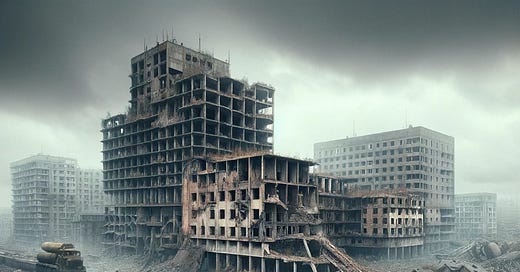In a dramatic turn of events that underscores the ebb and flow of the conflict in Eastern Europe, Russian President Vladimir Putin hailed the seizure of Avdiivka as "an important victory." This announcement came on the heels of Ukraine's military chief admitting that after enduring months of fierce fighting, Ukrainian forces had withdrawn from the ravaged town located in the country's east. Despite claims from the Russian defense ministry that Ukrainian units remained holed up in the town's coke plant, this advancement marks Moscow's most significant gain since capturing Bakhmut last May, presenting a stark reminder of the war's shifting dynamics.
This development arrived just days before the second anniversary of Russia's full-scale invasion of Ukraine, a period marked by acute shortages of ammunition for Ukraine and significant delays in the arrival of fresh U.S. military aid due to congressional holdups. It's seen as the most vivid indication yet of the war's momentum swinging in favor of Moscow, especially after a Ukrainian counteroffensive last year failed to pierce Russian defenses. The Kremlin's public commendation of Russian soldiers for this victory underscores the strategic and symbolic weight of Avdiivka's capture.
Amid this backdrop, U.S. President Joe Biden issued a stark warning regarding Avdiivka's precarious position, attributing its vulnerability to prolonged ammunition shortages exacerbated by political gridlock in the U.S. Congress. Biden's conversation with Ukrainian President Volodymyr Zelenskiy emphasized America's ongoing support for Ukraine, highlighting the urgency for Congress to approve additional military aid to restock Ukrainian arsenals.
The capture of Avdiivka is poised to bolster Russian morale as Putin eyes re-election, while also further entrenching Moscow's grip on the Donetsk region—a stronghold held by Russian and pro-Russian forces since 2014. Yet, the victory comes at a high cost, with Russia tight-lipped about its casualties but facing considerable losses according to Ukrainian officials and Western analysts.
Meanwhile, the situation at Avdiivka's Coke and Chemical plant remains unresolved, with Russian efforts to secure complete control ongoing. On the diplomatic front, President Zelenskiy's appeals for increased military support at the Munich Security Conference, coupled with his engagements with U.S. lawmakers, underscore the dire need for more robust Western backing to counter Russian advances and weaponry.
As Ukraine regroups and repositions its forces around Avdiivka, the resolve of its troops remains unshaken despite the challenges posed by dwindling supplies and mounting Russian pressure. The Third Assault Brigade's redeployment to the town's outskirts signifies a strategic withdrawal aimed at preventing encirclement and safeguarding Ukrainian soldiers' lives, even as the battlefront dynamics continue to evolve. With Avdiivka bearing the brunt of Russia's intensified offensives since last October, the situation underscores the critical importance of sustained and enhanced Western military aid for Ukraine's defense and the broader fight for sovereignty.





Tough to see this one fall, but hopefully it marks a strategic exit that saves manpower and ammo for later.